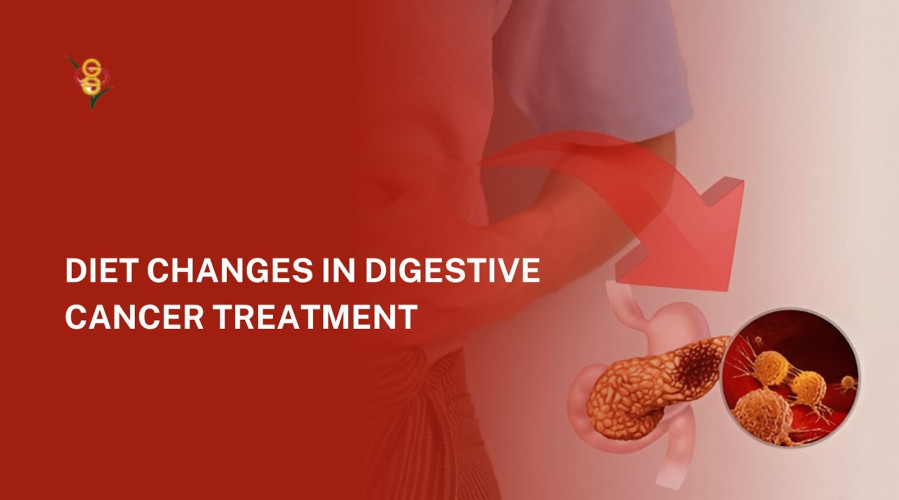Learn what gallstones are, their common symptoms, causes, and treatment options. Discover when to seek medical care and how to manage gallstone complications effectively.
Navigating Dietary Changes During Digestive Cancer Treatment

Treating Digestive Cancer can be a physically and emotionally daunting task. Diet changes are still one of the most significant adjustments patients need to make to support their health during and after treatment. Eating the proper foods can help control side effects, boost energy levels, and aid recovery.
In the following blog, we shall be discussing how to manage dietary changes during digestive cancer treatment and how to make healthy food choices during this period.
Why Diet Matters During Digestive Cancer Treatment
During cancer treatment, your body requires a high level of nutrients to maintain strength. But therapies such as chemotherapy, radiation and surgery may lead to side effects that will impact your eating patterns. Some common issues include:
- Loss of Appetite – Feeling full quickly or not feeling hungry at all.
- Nausea and Vomiting – Making it hard to keep food down.
- Diarrhea or Constipation – Disrupting digestion.
- Taste Changes – Making food taste bland or metallic.
- Difficulty Swallowing – Especially if the cancer affects the throat or stomach.
These symptoms can be managed with a well-balanced diet and a good nourishing plan.
Best Foods to Eat During Treatment
The foods you choose can have a significant impact on how you feel. Here are a few health-promoting foods:
1. High-Protein Foods
Protein aids in body tissue repair and strength maintenance. Try:
- Eggs
- Lean meats (chicken, fish, turkey)
- Dairy products (milk, yogurt, cheese)
- Nuts and seeds
- Lentils and beans
2. Easy-to-Digest Carbohydrates
Carbohydrates provide energy. If you have a sensitive stomach, opt for:
- Rice
- Oatmeal
- Bananas
- Mashed potatoes
- Whole wheat bread
3. Healthy Fats
There are good fats that give you energy and can maintain your health. Include:
- Olive oil
- Avocados
- Nuts
- Fatty fish like salmon
4. Hydrating Foods and Fluids
Hydration is essential, especially when you have diarrhea or vomiting. Drink:
- Water
- Herbal teas
- Clear broths
- Coconut water
Focus on hydrating foods — watermelon, cucumber, soups.
5. Fruits and Vegetables
Vitamins and antioxidants found in fruits and veggies help boost your immune system. Choose:
- Soft fruits like bananas, pears, and applesauce
- Cooked vegetables like carrots, spinach, and zucchini
- Blended smoothies for an easy way to get nutrients
Foods to Avoid During Treatment
Certain foods can exacerbate side effects. Try to avoid:
- Spicy and Acidic Foods – Can irritate the stomach (chili, citrus fruits, tomatoes).
- Greasy and Fried Foods – Hard to digest (deep-fried snacks, heavy creams).
- Processed Foods – Contain artificial ingredients (packaged snacks, instant noodles).
- Caffeinated and Alcoholic Drinks – Can cause dehydration and irritation.
Tips for Managing Eating Difficulties
If you’re having a hard time eating, try these tips:
- Eat Small Meals Often – Replace three large meals in a day with five to six small meals.
- Choose Soft and Moist Foods – Soups, yogurts and soft foods can be easier to swallow.
- Adjust Food Temperatures – You may find it easier to eat cold foods if you have mouth sores.
- Try Mild Seasonings – If food is a little bland, add herbs like basil or cinnamon.
- Use Nutritional Supplements – If eating is difficult, ask your doctor about protein shakes.
Eating the right foods when it comes to digestive cancer will allow you to have a better quality of life while undergoing treatment and aid healing, for more details on this, please see: What Dietary Choices Make Sense When Treating Digestive Cancer? Every body responds differently, so it is crucial to listen to your body and collaborate with a health professional to determine the best diet for you.
With a little help from our expertise on nutrition and general care during cancer treatment at GEM Hospital. If you or someone you love need help, schedule your appointment now.
Blogs & Article
Learn about bloating and gas problems, including common causes, symptoms, and effective solutions to improve digestion, reduce discomfort, and maintain gut health.
Learn how unverified Ayurveda treatments may cause liver damage, understand the risks, symptoms, and why medical guidance is essential for safe care.


